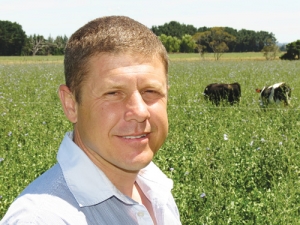NZ Catchment Groups Thrive with ‘Source to Sea’ Approach
The most successful catchment groups in NZ are those that have 'a source to sea' approach.
 Massey’s Prof Paul Kenyon says with the likelihood of a dry summer, sheep farmers need to prepare now!
Massey’s Prof Paul Kenyon says with the likelihood of a dry summer, sheep farmers need to prepare now!
With the likelihood of a dry summer for many parts of New Zealand sheep farmers need to prepare now, says Professor Paul Kenyon, Massey University.
Two things stand out: first, act quickly; secondly, think long term.
"When thinking long term they need to remember that nutrition of the ewe and replacement ewe lambs/hoggets this summer will affect next year's lamb crop and the longevity of these animals within the flock.
"At weaning, mature ewes should be condition scored and ewes in poor condition (BCS 2.5 or less) put in a priority mob and offered enough feed over summer to gain condition (it takes 7-8kg to gain one unit on body condition for most breeds)."
These sheep could be managed in front of the remainder of a ewe flock, which can be held at maintenance, Kenyon says. This split flock approach saves feed.
"Farmers should weigh a sample of replacement ewe lambs at weaning. Using this data they should map out monthly liveweight targets for the next five months at least.
"Monthly, a sub sample should then be reweighed and their performance compared with target. If they are falling behind, action plans should be put in place to remedy the situation."
Meanwhile, Kenyon stresses that regardless of whether or not they are to be bred as a hogget, ewe lamb replacements need to be a priority stock class over summer.
"Ideally, if fed on pasture only they should be offered grazing in which pasture covers do not fall below 1200kg DM/ha – that is, high in green content (i.e. no reproductive material or dead plant matter) and as much clover as possible. If summer crops are available, permanent or annual, these should be the class of stock that utilise these."
Kenyon says that by acting early farmers should be able to save feed for priority stock classes and sell livestock prior to the drop in prices or prior to when it becomes difficult to get cull ewes and lambs into the abattoir. A number of options present.
"Skim weaning can be used to remove heavy lambs then sell them directly for slaughter prior to the normal weaning date. This will allow these lambs to be sold at a premium, and it saves feed for other lambs.
"If pasture covers are decreasing farmers should reconsider weaning date. In late lactation if the ewe is not gaining liveweight herself she can stop lactating. Further, under poor feeding conditions the ewe and her lamb(s) can become grazing competitors."
Ewes that could be weaned early are the older ones destined to be culled, based on age or singleton bearing, whose lambs tend to be heavier and best able to cope with early weaning.
"Weaning culled-for-age ewes early should help ensure these can be sold before it gets difficult to gain access to the abattoir, and it will save precious feed.
"If weaning is done early, lambs should be a minimum of 20kg and should be offered a high quality feed. This could include pasture with a high percentage of clover, herb-clover mixes, lucerne or a quality annual crop."
Sheep researchers at Massey, with funding from Beef + and Lamb NZ, are examining early- and post weaning options using alternative herbages.
In dry years farmers should reconsider their finishing policy, Kenyon says. While it might be tempting to finish extra lambs, it may be more sensible to sell these store lambs at weaning, saving excess feed for replacements, or to have a clear minimum weight and sell all lambs below this store at weaning.
"Under dry conditions too many months can have negative consequences – for these lambs and for future lamb crops – if replacements are not well grown or mature ewes fail to regain body condition by mating."
The Meat Industry Association of New Zealand (MIA) today announced that Chief Executive Officer Sirma Karapeeva has resigned from the role.
The winners of the 2026 Hawke’s Bay/Wairarapa Dairy Industry Awards were announced at the annual awards dinner held at Copthorne Solway Park in Masterton on Thursday evening.
Environment Southland is welcoming this week’s decision by the Environmental Protection Authority (EPA) to approve the release of Blaptea elguetai, a leaf‑feeding beetle that will help control the highly invasive Chilean flame creeper.
This March, the potato industry is proudly celebrating International Women’s Day on 8 March alongside the International Year of the Woman Farmer, recognising the vital role women play across every part of the sector — from paddocks and packhouses to research, leadership, and innovation.
Fruit trader Seeka posted a record profit and returns to shareholders in 2025.
Recent weather events in the Bay of Plenty, Gisborne/Tairawhiti, and Canterbury have been declared a medium-scale adverse event.
OPINION: Staying with politics, with less than nine months to go before the general elections, there’s confusion in the Labour…
OPINION: Winston Peters' tirade against the free trade deal stitched with India may not be all political posturing by the…